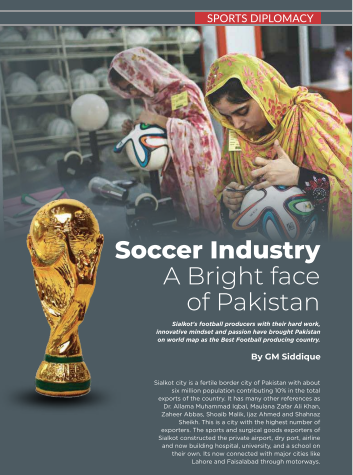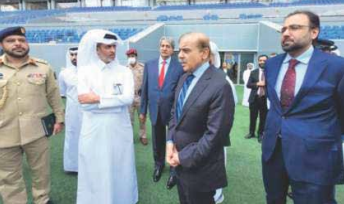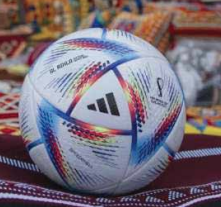
Sialkot’s football producers with their hard work, innovative mindset and passion have brought Pakistan on world map as the Best Football producing country.
By GM Siddique
Sialkot city is a fertile border city of Pakistan with about six million population contributing 10% in the total exports of the country. It has many other references as Dr. Allama Muhammad Iqbal, Maulana Zafar Ali Khan, Zaheer Abbas, Shoaib Malik, Ijaz Ahmed and Shahnaz Sheikh. This is a city with the highest number of exporters. The sports and surgical goods exporters of Sialkot constructed the private airport, dry port, airline and now building hospital, university, and a school on their own. Its now connected with major cities like Lahore and Faisalabad through motorways.
In Pakistan, Sialkot is famous for football production and has strong brand name in the world of sports for its high-quality hand stitched balls. All the famous brands outsource their footballs from Sialkot. In Sialkot, there is a history of nearly 100 years of producing and exporting footballs.

In the world Sialkot is famous for sports and surgical goods like footballs, cricket bats and balls, table tennis balls, various types of rackets of tennis, squash and badminton, sports shoes, sportswear, and other sports goods. When people watch any winning shot in FIFA, the football under billions of eyes is made in Sialkot. Football has a major share in the sports goods sector, offering employment to 300,000 to 350,000 skilled and unskilled laborers and about 1.5% percent of Pakistan’s total export basket. With the help of SMEDA, Sports Industries Development Centre, it is getting ready to build the capacity of the inflatable hand-stitched football or soccer balls, meeting 70% world’s needs.
Sialkot has regained its honor of being the hub of football producing city as 60% of world’s balls are now being produced in this city for all world top brands like Adidas, Nike, Puma, Lotto, Umbro, Mitre, Micassa, Diadora, Wilson, Decathlon, etc.
Since 2018, Sialkot has regained its honor of being the hub of football producing city as 60% of world’s balls are now being produced in this city for all world top brands like Adidas, Nike, Puma, Lotto, Umbro, Mitre, Micassa, Diadora, Wilson, Decathlon, etc. Sialkot’s football producers with their hard work, innovative mindset and passion have brought Pakistan on world map as the Best Football producing country.

In international market, footballs are distinguished on the basis of performance, quality, price, and technology. There are different varieties and types of footballs, which further categorize on the bases of their use and technology. In terms of use, there are six different categories of football which include: International match ball, Club’s matches’ ball, practice and training ball for upcoming matches, indoor balls, promotional balls, Futsal football.
Pakistan has a rich history as a manufacturer of quality hand-stitched footballs. The history of soccer ball production is traced back to British colonial era, in the late 18th or early 19th century, of the sub-continent. The Britons who were very fond of football used to order their stock from Britain and at times they would get impatient with the waiting time for shipment of footballs to arrive by the sea. It is said that in 1886 a British sergeant asked a Sialkoti saddle maker to repair his punctured ball and he was amazed by the technique and the way the saddler replaced some leather panels making the football as good as new. Impressed with his skills he placed order with him for a batch of football and since then the city is producing major share of footballs for the game, players and lovers.
Sialkot Chamber of Commerce & Industry (SCCI) Senior Vice President Sheikh Zohaib Rafique Sethi says that “Al Rihla” would be used in the FIFA World Cup 2022 in Qatar. The Sialkot football industry has been thriving even through adversarial conditions.

This is not the first time that Pakistan has the honor of producing ball for the world’s most iconic sports. ‘Forward Sports Sialkot’ a renowned company of Sialkot is famous world over for production of sports goods, the largest football producing facility in the world, has produced World Cup balls in 2014 (Brazil). The football manufactured by Pakistan came to be known as Telstar 18 was used in Football World Cup 2018 (Russia), which was manufactured by Forward Sports Company. The ball featured six panels alongside a unique surface that would provide improved grip, touch, stability and aerodynamics on the field. Pakistan has the unique honor of supplying footballs for use in the Soccer World Cup of 2018 held in Russia and now for upcoming Soccer World Cup 2022 to be held in Qatar.
Forward Sports started its journey in 1990 with a humble beginning of 1000 balls per day in Hand Stitch technology is now the world’s largest Football producer with an annual production of 15 million balls per annum.
Forward Sports has been able to reach this level by shifting conventional hand stitch football cottage industry to highly mechanized small and medium enterprise. As per Mr. Masood, founder of Forward Sports, key to their success is their appetite towards innovation and Lean Manufacturing System. Following innovation strategy, Forward Sports was able to introduce multiple production technologies to make a football like Thermo bonded (2007), Official Match ball (2009), Machine Stitch (2010), World Cup ball (2014), Airless Mini ball (2018) and Laminated Ball (2020). And Lean Manufacturing System strategy supports Forward Sports to minimize their indirect cost by eliminating non-value adding activities and shifting human skill to custom made Robotic machines.
The major players in football manufacturing include Forward Sports (Pvt) Ltd., Capital Sports Corporation (Pvt) Ltd., Ali Trading (Pvt) Ltd., Anwar Khawja Industries (Pvt) Ltd., and Comet Sports (Pvt) Ltd.
The brands that have dominance in football market are actually not the producers. They get footballs from various developing countries due to low cost of production. China, Pakistan, and Thailand are the major hub for this and jointly contribute 70% of total export of footballs. Pakistan’s football industry enjoyed leadership status in international market but in recent years it is facing competition with China, India, Thailand, and Taiwan.
They come up with some new and sophisticated technology, which enables them to provide better product at less price. Pakistan produces higher quality hand-stitched balls while China produces machine-stitched balls. In FY 2021-22 Pakistan exported 43.71 million (3,643,000 dozen) footballs worth US$191 million (PBS trade data).
The writer is an expert on industries and a freelance journalist.

